Kaist
Korean

News
College of Engineering News
-

The Medici Effect: Highly Flexible, Wearable Displ..
< Ph.D. candidate Seungyeop Choi > How do you feel when technology you saw in a movie is made into reality? Collaboration between the electrical engineering and textile industries has made TVs or smartphone screens displaying on clothing a reality. A research team led by Professor Kyung Cheol Choi at the School of Electrical Engineering presented wearable displays for various applications including fashion, IT, and healthcare. Integrating OLED (organic light-emitting diode) into fabrics, the team developed the most highly flexible and reliable technology for wearable displays in the world. Recently, information displays have become increasingly important as they construct the external part of smart devices for the next generation. As world trends are focusing on the Internet of Things (IoTs) and wearable technology, the team drew a lot of attention by making great progress towards commercializing clothing-shaped ‘wearable displays’. The research for realizing displays on clothing gained considerable attention from academia as well as industry when research on luminescence formed in fabrics was introduced in 2011; however, there was no technology for commercializing it due to its surface roughness and flexibility. Because of this technical limitation, clothing-shaped wearable displays were thought to be unreachable technology. However, the KAIST team recently succeeded in developing the world’s most highly efficient, light-emitting clothes that can be commercialized. The research team used two different approaches, fabric-type and fiber-type, in order to realize clothing-shaped wearable displays. In 2015, the team successfully laminated a thin planarization sheet thermally onto fabric to form a surface that is compatible with the OLEDs approximately 200 hundred nanometers thick. Also, the team reported their research outcomes on enhancing the reliability of operating fiber-based OLEDs. In 2016, the team introduced a dip-coating method, capable of uniformly depositing layers, to develop polymer light-emitting diodes, which show high luminance even on thin fabric. Based on the research performance in 2015 and 2016, Ph.D. candidate Seungyeop Choi took the lead in the research team and succeeded in realizing fabric-based OLEDs, showing high luminance and efficiency while maintaining the flexibility of the fabric. The long-term reliability of this wearable device that has the world’s best electrical and optical characteristics was verified through their self-developed, organic and inorganic encapsulation technology. According to the team, their wearable device facilitates the operation of OLEDs even at a bending radius of 2mm. According to Choi, “Having wavy structures and empty spaces, fiber plays a significant role in lowering the mechanical stress on the OLEDs.” “Screen displayed on our daily clothing is no longer a future technology,” said Professor Choi. “Light-emitting clothes will have considerable influence on not only the e-textile industry but also the automobile and healthcare industries.” Moreover, the research team remarked, “It means a lot to realize clothing-shaped OLEDs that have the world’s best luminance and efficiency. It is the most flexible fabric-based light-emitting device among those reported. Moreover, noting that this research carried out an in-depth analysis of the mechanical characteristics of the clothing-spared, light-emitting device, the research performance will become a guideline for developing the fabric-based electronics industry.” This research was funded by the Ministry of Trade, Industry and Energy and collaborated with KOLON Glotech, INC. The research performance was published in Scientific Reports in July. < OLEDs operating in fabrics > < Current-voltage-luminance and efficiency of the highly flexible, fabric-based OLEDs;Image of OLEDs after repetitive bending tests;Verification of flexibility through mechanical simulation >
-
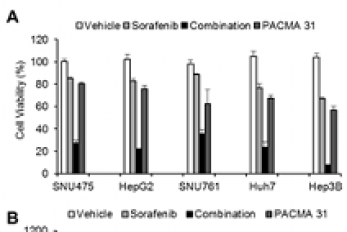
Discovery of an Optimal Drug Combination: Overcomi..
A KAIST research team presented a novel method for improving medication treatment for liver cancer using Systems Biology, combining research from information technology and the life sciences. Professor Kwang-Hyun Cho in the Department of Bio and Brain Engineering at KAIST conducted the research in collaboration with Professor Jung-Hwan Yoon in the Department of Internal Medicine at Seoul National University Hospital. This research was published in Hepatology in September 2017 (available online from August 24, 2017). Liver cancer is the fifth and seventh most common cancer found in men and women throughout the world, which places it second in the cause of cancer deaths. In particular, Korea has 28.4 deaths from liver cancer per 100,000 persons, the highest death rate among OECD countries and twice that of Japan. Each year in Korea, 16,000 people get liver cancer on average, yet the five-year survival rate stands below 12%. According to the National Cancer Information Center, lung cancer (17,399) took the highest portion of cancer-related deaths, followed by liver cancer (11,311) based on last year data. Liver cancer is known to carry the highest social cost in comparison to other cancers and it causes the highest fatality in earlier age groups (40s-50s). In that sense, it is necessary to develop a new treatment that mitigates side effects yet elevates the survival rate. There are ways in which liver cancer can be cured, such as surgery, embolization, and medication treatments; however, the options become limited for curing progressive cancer, a stage in which surgical methods cannot be executed. Among anticancer medications, Sorafenib, a drug known for enhancing the survival rate of cancer patients, is a unique drug allowed for use as a targeted anticancer medication for progressive liver cancer patients. Its sales reached more than ten billion KRW annually in Korea, but its efficacy works on only about 20% of the treated patients. Also, acquired resistance to Sorafenib is emerging. Additionally, the action mechanism and resistance mechanism of Sorafenib is only vaguely identified. Although Sorafenib only extends the survival rate of terminal cancer patients less than three months on average, it is widely being used because drugs developed by global pharmaceutical companies failed to outperform its effectiveness. Professor Cho’s research team analyzed the expression changes of genes in cell lines in response to Sorafenib in order to identify the effect and the resistance mechanism of Sorafenib. As a result, the team discovered the resistance mechanism of Sorafenib using Systems Biology analysis. By combining computer simulations and biological experiments, it was revealed that protein disulfide isomerase (PDI) plays a crucial role in the resistance mechanism of Sorafenib and that its efficacy can be improved significantly by blocking PDI. The research team used mice in the experiment and discovered the synergic effect of PDI inhibition with Sorafenib for reducing liver cancer cells, known as hepatocellular carcinoma. Also, more PDIs are shown in tissue from patients who possess a resistance to Sorafenib. From these findings, the team could identify the possibility of its clinical applications. The team also confirmed these findings from clinical data through a retrospective cohort study. “Molecules that play an important role in cell lines are mostly put under complex regulation. For this reason, the existing biological research has a fundamental limitations for discovering its underlying principles,” Professor Cho said. “This research is a representative case of overcoming this limitation of traditional life science research by using a Systems Biology approach, combining IT and life science. It suggests the possibility of developing a new method that overcomes drug resistance with a network analysis of the targeted drug action mechanism of cancer.” The research was supported by the National Research Foundation of Korea (NRF) and funded by the Ministry of Science and ICT. < Figure 1. Simulation results from cellular experiments using hepatocellular carcinoma > < Figure 2. Network analysis and computer simulation by using the endoplasmic reticulum (ER) stress network > < Figure 3. ER stress network model >
-
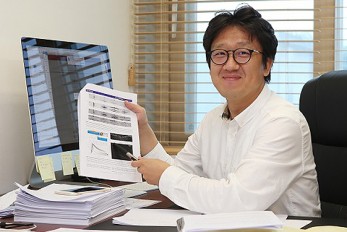
Solutal Marangoni Flows of Miscible Liquid Drive T..
< Professor Hyoungsoo Kim, Department of Mechanical Engineering, KAIST > A research team led by Hyoungsoo Kim, a professor of Mechanical Engineering at KAIST, succeeded in quantifying the phenomenon called, the Marangoni effect, which occurs at the interface between alcohol and water. It is expected that this finding will be a valuable resource used for effectively removing impurities from a surface fluid without any contamination, and developing materials that can replace surfactants. This research, co-conducted with a research team led by Professor Howard A. Stone at Princeton University, was published online in Nature Physics on July 31. The Marangoni effect, also known as tears of wine, is generated when two fluids having a different surface tension meet, causing finite mixing, spreading time and length scale. Typically, people believe that infinitely miscible liquids immediately mix together; however, it is not always true according to this paper. The typical surface tension of alcohol is three times lower than that of water, and this different surface tension generates the Marangoni-driven convection flow at the interface of the two liquids. In addition, there is a certain amount of time required for them to mix. This phenomenon has been discussed many times since it was discovered in early the 20th century, yet there was a limit to quantifying and explaining it. Professor Kim, considering the mixing and spreading mechanism, used various flow visualization techniques and equipment for capturing high speed images in his experiment. Through the flow visualization methods, the team succeeded in quantifying and explaining the complex, physicochemical phenomenon generated between water and alcohol. Moreover, they developed a theoretical model to predict the physicochemical hydrodynamic phenomena. The theoretical model can predict the speed of Marangoni-driven convection flow, the area of a drop of alcohol and the time required to develop the flow field. Hence, this model can map out types of materials (e.g., alcohol) and the volume of a drop of liquid as applicable to target a specific situation. Moreover, the research team believes that the interfacial flow enables the driving of bulk flows and that it can be a source of technology for effectively delivering drugs and removing impurities from a surface of substance without causing secondary contamination. Above all, the results show a possibility for replacing surfactant with alcohol as a material used for delivering drugs. In the case of the drug delivery, some drugs are encapsulated with a surfactant in order to be effectively transported in vivo; however, the surfactant accumulates in the body, which can cause various side effects, such as heart disease. Therefore, using new materials like alcohol for drug delivery will contribute to preventing the side effects caused by the surfactant. “The surfactant is used for delivering drugs, but it is difficult to be expelled from the body. This will cause various side effects, such as heart diseases in asthmatic patients,” said Professor Kim. “I hope that using new materials, like alcohol, will free people from these side effects.” (Marangoni-driven convection flow generated at the interface between water and alcohol, and the flow visualization results) < A drop of alcohol on a water surface > < Comparison of mixing structures on the surface > < Marangoni mixing flow under the free surface >
-
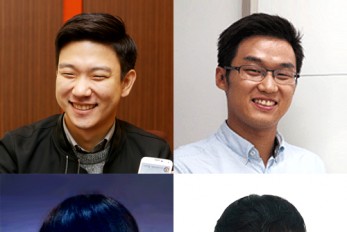
Students from Science Academies Shed a Light on KA..
Recent KAIST statistics show that graduates from science academies distinguish themselves not only by their academic performance at KAIST but also in various professional careers after graduation. Every year, approximately 20% of newly-enrolled students of KAIST are from science academies. In the case of the class of 2017, 170 students from science academies accounted for 22% of the newly-enrolled students. Moreover, they are forming a top-tier student group on campus. As shown in the table below, the ratio of students graduating early for either enrolling in graduate programs or landing a job indicates their excellent performance at KAIST. There are eight science academies in Korea: Korea Science Academy of KAIST located in Busan, Seoul Science High School, Gyeonggi Science High School, Gwangju Science High School, Daejeon Science High School, Sejong Academy of Science and Arts, and Incheon Arts and Sciences Academy. Recently, KAIST analyzed 532 university graduates from the class of 2012. It was found that 23 out of 63 graduates with the alma mater of science academies finished their degree early; as a result, the early graduation ratio of the class of 2012 stood at 36.5%. This percentage was significantly higher than that of students from other high schools. ????? Among the notable graduates, there was a student who made headlines with donation of 30 million KRW to KAIST. His donation was the largest donation from an enrolled student on record. His story goes back when Android smartphones were about to be distributed. Seung-Gyu Oh, then a student in the School of Electrical Engineering felt that existing subway apps were inconvenient, so he invented his own subway app that navigated the nearest subway lines in 2015. His app hit the market and ranked second in the subway app category. It had approximately five million users, which led to it generating advertising revenue. After the successful launch of the app, Oh accepted the takeover offered by Daum Kakao. He then donated 30 million KRW to his alma mater. “Since high school, I’ve always been thinking that I have received many benefits from my country and felt heavily responsible for it,” the alumnus of Korea Science of Academy and KAIST said. “I decided to make a donation to my alma mater, KAIST because I wanted to return what I had received from my country.” After graduation, Oh is now working for the web firm, Daum Kakao. In May 24, 2017, the 41st International Collegiate Programming Contest, hosted by Association for Computing Machinery (ACM) and sponsored by IBM, was held in Rapid City, South Dakota in the US. It is a prestigious contest that has been held annually since 1977. College students from around the world participate in this contest; and in 2017, a total of 50,000 students from 2,900 universities in 104 countries participated in regional competitions, and approximately 400 students made it to the final round, entering into a fierce competition. KAIST students also participated in this contest. The team was comprised of Ji-Hoon Ko, Jong-Won Lee, and Han-Pil Kang from the School of Computing. They are also alumni of Gyeonggi Science High School. They received the ‘First Problem Solver’ award and a bronze medal which came with a 3,000 USD cash prize. Sung-Jin Oh, who also graduated from Korea Science Academy of KAIST, is a research professor at the Korea Institute of Advanced Study (KIAS). He is the youngest recipient of the ‘Young Scientist Award’, which he received by proving a hypothesis from Einstein’s Theory of General Relativity mathematically at the age of 27. After graduating from KAIST, Oh earned his master’s and doctorate degrees from Princeton University, completed his post-doctoral fellow at UC Berkeley, and is now immersing himself in research at KIAS. Heui-Kwang Noh from the Department of Chemistry and Kang-Min Ahn from the School of Computing, who were selected to receive the presidential scholarship for science in 2014, both graduated from Gyeonggi Science High School. Noh was recognized for his outstanding academic capacity and was also chosen for the ‘GE Foundation Scholar-Leaders Program’ in 2015. The ‘GE Foundation Scholar-Leaders Program’, established in 1992 by the GE Foundation, aims at fostering talented students. This program is for post-secondary students who have both creativity and leadership. It selects five outstanding students and provides 3 million KRW per annum for a maximum of three years. The grantees of this program have become influential people in various fields, including professors, executives, staff members of national/international firms, and researchers. And they are making a huge contribution to the development of engineering and science. Noh continues doing various activities, including the completion of his internship at ‘Harvard-MIT Biomedical Optics’ and the publication of a paper (3rd author) for the ACS Omega of American Chemical Society (ACS). Ahn, a member of the Young Engineers Honor Society (YEHS) of the National Academy of Engineering of Korea, had an interest in startup businesses. In 2015, he founded DataStorm, a firm specializing in developing data solution, and merged with a cloud back-office, Jobis & Villains, in 2016. Ahn is continuing his business activities and this year he founded, and is successfully running, cocKorea. “KAIST students whose alma mater are science academies form a top-tier group on campus and produce excellent performance,” said Associate Vice President for Admissions, Hayong Shin. “KAIST is making every effort to assist these students so that they can perform to the best of their ability.” (Clockwise from top left: Seung-Gyu Oh, Sung-Jin Oh, Heui-Kwang Noh and Kang-Min Ahn)
-
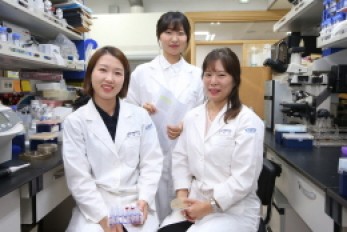
KAIST Researchers Receive Three Awards at the 13th..
< From left: Seon Young Park, Dr. So Young Choi, and Yoojin Choi > Researchers in the laboratory of KAIST Distinguished Professor Sang Yup Lee from the Department of Chemical and Biomolecular Engineering swept awards at the 13th Asian Congress on Biotechnology held in Thailand last month. The conference awarded a total of eight prizes in the areas of best research and best poster presentation. This is an exceptional case in which members of one research team received almost half of the awards at an international conference. Dr. So Young Choi received the Best Research Award, while Ph.D. candidates Yoojin Choi and Seon Young Park each received the Best Poster Presentation Award at the conference held in Khon Kaen, Thailand from July 23 to 27. The Asian Congress on Biotechnology is an international conference in which scientists and industry experts in Asia and from around the world gather to present recent research findings in the field of biotechnology. At the conference, around 400 researchers in biotechnology from 25 countries, including Korea, gathered to present and discuss various research findings under the theme of “Bioinnovation and Bioeconomy.” Distinguished Professor Sang Yup Lee attended the conference to give the opening plenary lecture on the topic of ‘Systems Strategies in Biotechnology.’ Professor Lee announced, “I have attended international conferences with students for the last 20 years, but this is the first in which my team received three awards at an international conference that only honors a total of eight awards, three for Best Research and five for Best Presentation.” Dr. Choi presented research results on poly (lactate-co-glycolate) (PLGA) synthesis through a biological method using micro-organisms and received the Best Research Award. PLGA is a random copolymer of DL-lactic and glycolic acids and is a biopolymer widely used for biomedical applications. PLGA is biodegradable, biocompatible, and nontoxic, and thus has been approved by the US Food and Drug Administration (FDA) for its use in implants, drug delivery, and sutures. Dr. Choi’s research was deemed to be innovative for synthesizing PLGA from glucose and xylose in cells through metabolic engineering of E.Coli. Dr. Choi received her Ph.D. under the supervision of Distinguished Professor Lee this February and is currently conducting post-doc research. Ph.D. candidate Choi presented her research on the use of recombinant E.Coli for the biological synthesis of various nanoparticles and received the Best Poster Presentation award. Choi used recombinant E.Coli-expressing proteins and peptides that adsorb to heavy metals to biologically synthesize diverse metal nanoparticles such as single-nanoparticle including gold and silver, quantum dots, and magnetic nanoparticles for the first time. The synthesized nanoparticles can be used in the fields of bio-imaging, diagnosis, environment, and energy. Ph.D. candidate Park, who also received the Best Poster Presentation award, synthesized and increased production of astanxanthin, a strong antioxidant found in nature, in E.Coli using metabolic engineering. Astanxanthin is a carotenoid pigment found in salmon and shrimp that widely used in health products and cosmetics.
-
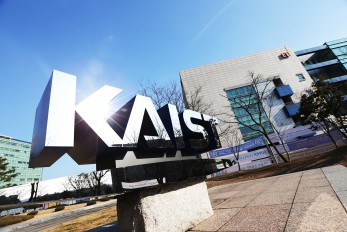
[Biz & Tech] Scientists develop platform to remote..
By Lee Min-hyung A team of scientists developed have a software platform to remotely control a string of mobile devices, which will allow users to keep track of in-app information on any smart devices, the Korea Institute of Science and Technology (KAIST) said Friday. The team led by KAIST professor Shin In-sik said it developed the mobile platform technology, called Mobile Plus. It enables a smartphone app to share its data and functions with any other devices and vice versa. The primary goal of Mobile Plus is to enable unmodified applications to share functionalities across devices, KAIST said. With Mobile Plus, such in-app functionalities as login and payment can also be shared among devices. "The mobile software is expected to serve as a hub to interconnect various smart devices more conveniently, as users are not hassled to install the same apps in each device," a KAIST official said. For example, parents can use Mobile Plus to monitor payment records in their kids' smartphones. The research team took advantage of "remote procedure call" technology, which removes the need for developers to modify app code when sharing app functions across devices. "Users can also continue using the same app in multiple devices without buying or installing it on each device," the official said. "The researchers are now focusing on promoting the software to widen its user base. Toward that end, we encourage Google to adopt the platform so more users can benefit from the technology." The research team was upbeat for its growth potential, as the technology can be widely applied to emerging tech areas such as smart homes and smart vehicles. Shin said the Mobile Plus technology will generate synergy when combined with the two rising industries whose building block is to seamlessly connect a number of devices with real-time data. "With smartphones serving as a hub, the technology can provide novel user experiences, widely used for smart appliances and car infotainment systems," Shin said. The latest feat was introduced at this year's MobiSys Conference in the United States in June. The research team said it is has succeeded in demonstrating that a Mobile Plus prototype does not slow down performance of interlocked devices unless data transfer is large. The cross-device sharing platform is expected to boost development of creative and useful apps down the road, it said. The KAIST researchers applied for a patent here, and the team is seeking to raise its global profile by teaming up with overseas software players.
-

Multi-Device Mobile Platform for App Functionality..
Case 1. Mr. Kim, an employee, logged on to his SNS account using a tablet PC at the airport while traveling overseas. However, a malicious virus was installed on the tablet PC and some photos posted on his SNS were deleted by someone else. Case 2. Mr. and Mrs. Brown are busy contacting credit card and game companies, because his son, who likes games, purchased a million dollars worth of game items using his smartphone. Case 3. Mr. Park, who enjoys games, bought a sensor-based racing game through his tablet PC. However, he could not enjoy the racing game on his tablet because it was not comfortable to tilt the device for game control. The above cases are some of the various problems that can arise in modern society where diverse smart devices, including smartphones, exist. Recently, new technology has been developed to easily solve these problems. Professor Insik Shin from the School of Computing has developed ‘Mobile Plus,’ which is a mobile platform that can share the functionalities of applications between smart devices. This is a novel technology that allows applications to easily share their functionalities without needing any modifications. Smartphone users often use Facebook to log in to another SNS account like Instagram, or use a gallery app to post some photos on their SNS. These examples are possible, because the applications share their login and photo management functionalities. The functionality sharing enables users to utilize smartphones in various and convenient ways and allows app developers to easily create applications. However, current mobile platforms such as Android or iOS only support functionality sharing within a single mobile device. It is burdensome for both developers and users to share functionalities across devices because developers would need to create more complex applications and users would need to install the applications on each device. To address this problem, Professor Shin’s research team developed platform technology to support functionality sharing between devices. The main concept is using virtualization to give the illusion that the applications running on separate devices are on a single device. They succeeded in this virtualization by extending a RPC (Remote Procedure Call) scheme to multi-device environments. This virtualization technology enables the existing applications to share their functionalities without needing any modifications, regardless of the type of applications. So users can now use them without additional purchases or updates. Mobile Plus can support hardware functionalities like cameras, microphones, and GPS as well as application functionalities such as logins, payments, and photo sharing. Its greatest advantage is its wide range of possible applications. Professor Shin said, "Mobile Plus is expected to have great synergy with smart home and smart car technologies. It can provide novel user experiences (UXs) so that users can easily utilize various applications of smart home/vehicle infotainment systems by using a smartphone as their hub." This research was published at ACM MobiSys, an international conference on mobile computing that was hosted in the United States on June 21. < Figure1. Users can securely log on to SNS accounts by using their personal devices > < Figure 2. Parents can control impulse shopping of their children. > < Figure 3. Users can enjoy games more and more by using the smartphone as a controller >
-
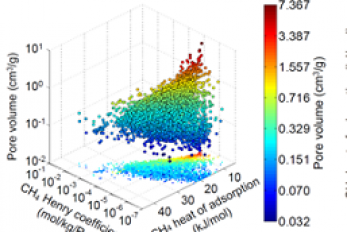
Analysis of Gas Adsorption Properties for Amorphou..
Professor Jihan Kim from the Department of Chemical and Biomolecular Engineering at KAIST has developed a method to predict gas adsorption properties of amorphous porous materials. Metal-organic frameworks (MOFs) have large surface area and high density of pores, making them appropriate for various energy and environmental-related applications. And although most MOFs are crystalline, these structures can deform during synthesis and/or industrial processes, leading to loss in long-range order. Unfortunately, without the structural information, existing computer simulation techniques cannot be used to model these materials. In this research, Professor Kim’s research team demonstrated that one can replace the material properties of structurally deformed MOFs with those of crystalline MOFs to indirectly analyze/model the material properties of amorphous materials. First, the team conducted simulations on methane gas adsorption properties for over 12,000 crystalline MOFs to obtain a large training set data, and created a resulting structure-property map. Upon mapping the experimental data of amorphous MOFs onto the structure-property map, results showed that regardless of crystallinity, the gas adsorption properties of MOFs showed congruence and consistency amongst one another. Based on these findings, selected crystalline MOFs with the most similar gas adsorption properties as the collapsed structure from the 12,000 candidates. Then, the team verified that the adsorption properties of these similar MOFs can be successfully transferred to the deformed MOFs across different temperatures and even to different gas molecules (e.g. hydrogen), demonstrating transferability of properties. These findings allow material property prediction in porous materials such as MOFs without structural information, and the techniques here can be used to better predict and understand optimal materials for various applications including, carbon dioxide capture, gas storage and separations. This research was conducted in collaboration with Professor Dae-Woon Lim at Kyoto University, Professor Myunghyun Paik at Seoul National University, Professor Minyoung Yoon at Gachon University, and Aadesh Harale at Saudi Arabian Oil Company. The research was published in the Proceedings of the National Academy of Sciences (PNAS) online on 10 July and the co-first authors were Ph. D. candidate WooSeok Jeong and Professor Dae-Woon Lim. This research was funded by the Saudi Aramco-KAIST CO2 Management Center. < Figure 1. Trends in structure - material property map and in collapsed structures > < Figure 2. Transferability between the experimental results of collapsed MOFs and the simulation results of crystalline MOFs >
-
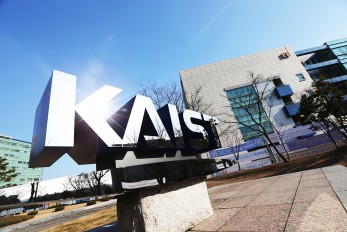
[Geek] Korean Students Invited to Build AI Soccer ..
● https://www.geek.com/tech/korean-students-invited-to-build-ai-soccer-players-1707322 We know artificial intelligence can outsmart humans at an abstract strategy board game. But can it bend it like Beckham? The Korea Advanced Institute of Science and Technology (KAIST) this week announced an upcoming AI soccer tournament for university students. Scheduled for November, the competition will include three machine-powered aspects: gameplay, analysis, and reporting, according to The Korea Times. Teams of five artificial players?four outfielders, one goalkeeper?will face off against each other in a series of preliminary matches. The final winner is set to be crowned on Dec. 1. KAIST is going full-ESPN, though, with the introduction of a game analysis contest, in which the neural network that creates “the most accurate … commentary” during matches wins a prize. The same goes for the AI reporter that pens the best post-match results “in a news-writing format,” the Times said. This fall’s event is a world first, according to KAIST, which encourages all local college and graduate school students to participate (applications are open through September). Famous for running an annual international robot soccer competition for the public since the mid-’90s, the academy is now turning its attention the next generation of creators. And assuming all goes well, the Institute promised to invite foreign clubs to next year’s tourney. “Overseas teams will be able to participate in the AI [soccer] matches next year, and we expect the tournament to become an internationally renowned tech event in the future,” computer engineering professor Kim Jong-hwan, president of KAIST’s AI World Cup Committee, told The Korea Times. The original International Micro Robot World Cup Soccer Tournament (MIROSOT)?now formally called RoboCup?was born in KAIST’s Robot Intelligence Technology Lab in 1995. An American team from Newton Labs won the first competition, held in Taejon, Korea, in November 1996. The Federation of International Robot-soccer Association (FIRA) was established two years later, just ahead of 1998’s International Robot Olympiad Committee (IROC), formed for the World Robot Olympiad.
-
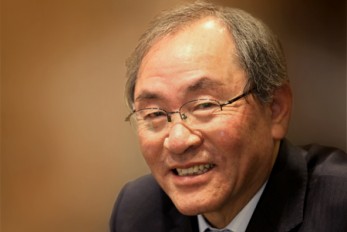
Professor Nam Jin Cho Selected as the Eugene P. Wi..
〈 Prof. Nam Jin Cho 〉 Professor Nam Jin Cho from the Department of Nuclear & Quantum Engineering was selected as the recipient of the 2017 ‘Eugene P. Wigner Reactor Physicist Award.’ The award, established in 1990 by the American Nuclear Society, honors individuals who have made outstanding contributions to the advancement of the field of reactor physics. The award is named after the late Eugene P. Wigner, a pioneer who helped nurture the nuclear age to technical maturity with his pioneering leadership in reactor design. Professor Cho was recognized for his outstanding leadership and achievement in the field of nuclear physics, especially with his original research in analytic function expansion nodal methods, coarse-mesh angular dependent rebalance methods, and neutron transport calculations. A fellow of the ANS, Professor Cho is the first awardee from the Asian region. Professor Cho gave all the credit to his colleagues and students at KAIST who have spared no effort while working together for three decades. “I am very grateful for the unique academic ambience which made this challenging work possible as well as the government’s continuing funding at the National Research Laboratory project.
-
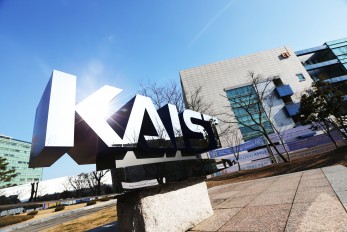
[Biz&Tech] KAIST to hold AI football tournament
By Lee Min-hyung The Korea Advanced Institute of Science and Technology (KAIST) said it will hold an artificial intelligence (AI) football tournament using an online simulation framework in November. The nation's leading technology institute said Tuesday that it will hold three AI-powered events football matches, game analysis and post-match news writing. To be specific, each team will consist of five players for the AI football matches. For the game analysis competition, those who create the most accurate analysis and commentary during the matches will win a prize. The AI reporter event participants will have to write post-match results in a news-writing format. "The football matches will be conducted in a five on five tournament. Each of the five AI-programmed players in such positions as striker, defender and goalkeeper will compete with their counterparts," a KAIST official said. The university will hold preliminary matches in November, with the final winner set to be announced on Dec. 1. Any college or graduate school student can apply for the tournament through the end of September. The AI-driven football tournament is a world first, according to KAIST. The university will invite foreign teams beginning next year. The institute is renowned for running an international robot football competition since 1996. The rise of AI and big data allowed KAIST to hold the new event this year. KAIST established what it calls the AI World Cup Committee last month, with professors from its major departments such as electronic engineering and industrial engineering playing a key role to prepare for the matches. KAIST said the event comes as part of its efforts to be in line with the upcoming Fourth Industrial Revolution by converging its technological expertise in such areas as the bio, nano, info-tech, robotics and AI fields. "Overseas teams will be able to participate in the AI football matches next year, and we expect the tournament to become an internationally-renowned tech event in the future," said Kim Jong-hwan, the president of the committee, who also serves as a professor of computer engineering at KAIST. ● http://www.koreatimes.co.kr/www/tech/2017/07/133_232786.html
-
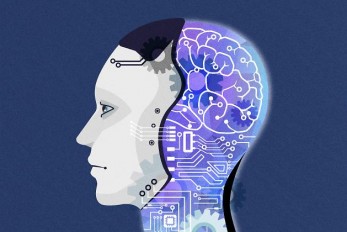
[Aju Business Daily] Public research university KA..
South Korea's top public research university will host an artificial intelligence world cup among undergraduate and postgraduate students in November. The Korea Advanced Institute of Science and Technology (KAIST) said it would co-host the 24-day "AI world Cup 2017" on November 1 with its Machine Intelligence and Robotics Multi-Sponsored Research and Education Platform. Each team will compete in a simulated football game, using skills its AI program has learned. AI will be evaluated over commentary of the matches. Robot professionals will be tested over news articles they write after analyzing the games. Students at South Korean universities and post-university classes are eligible but KAIST will open the door for foreign students next year. Park Sae-jin = swatchsjp@ajunews.com Aju Business Daily & www.ajunews.com Copyright: All materials on this site may not be reproduced, distributed, transmitted, displayed, published or broadcast without the authorization from the Aju News Corporation. ● http://www.ajudaily.com/view/20170711171543103

